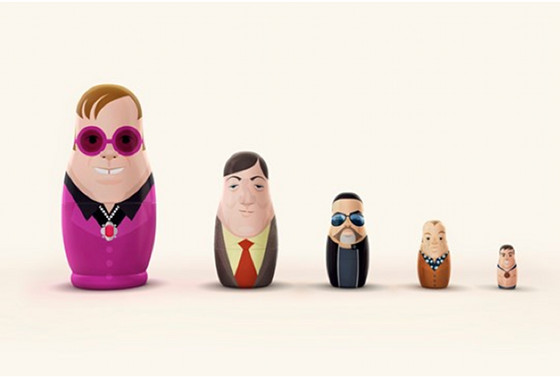
Laura’s Word 6 February 2014

It’s just a couple of days until the Sochi Winter Olympics – not that you could tell, judging by the volume of advertising and PR from the main sponsors. There’s still time, I guess, for big brand creativity to flood in but even that would struggle to fill the vacuum. As global celebrations of sport go, the games in Russia have been marred by controversy, rocked by terrorist attacks in the nearby Volgograd and many Western leaders have opted not to go. It’s hardly surprising that brands are dialling down the hype.
Given the Super Bowl adland extravaganza we’ve just experienced (or endured), the lack of Sochi-related advertising is particularly dramatic. Winter Games, of course, are never as high profile as Summer Olympics, but then according to Forbes the deals struck with sponsors, partners, licensees and suppliers are worth a total of half a trillion dollars, a record for any Olympic Games regardless of the season. So that can’t be it.
Russia’s anti-gay laws and reports of attacks by homophobic vigilantes have proven a bigger turn-off to the public than sponsors and organisers first anticipated. Coca-Cola was forced to take down a website that allowed fans to leave messages for athletes and McDonalds had to scrap its #cheerstosochi hashtag after both were hi-jacked by LGBT activists. If the issue wasn’t so serious for LGBT people living in Russia it would be almost funny – after years trying to get consumers to talk about ‘passions’ and embed themselves in ‘what matters to you’, it turns out that what we do really, truly care about can’t be marshalled by brands after all.

At this point it’s worth mentioning that the run-up to the games haven’t been entirely devoid of creativity – it’s just that most of the creativity has come from people opposing the games or, at least, protesting the homophobic laws. Mother London, for example, created ‘To Russia With Love’, a set of Russian dolls modelled on some of Britain’s most well-loved gay men. All Out released a video about a lesbian ice skater and her hidden love, which went viral last year.
The Sochi situation also raises a more general question about sports sponsorship, particularly for these international events. Sponsors of the 2012 London Olympics experienced their own mini-backlash. The extent to which the games organisers enforced sponsor privileges, not only within the Olympic venues but in the local area, became the subject of mockery. A small café not so far from where I live got a visit from LOCOG heavies when it was judged that the name Café Olympic breached rules. Their solution? Paint out the ‘O’. The story made it into the national papers and onto BBC 1 satirical show ‘Have I Got News For You’. And there were countless more examples – another café got a visit after hanging Olympic ring-shaped bagels in the window and bakers, butchers, toy-makers and other small businesses all made it into the news for ‘breaches’. While the Olympic sponsors themselves may not have been directly responsible for LOCOG’s heavy-handedness, they nonetheless found themselves cast in the mainstream news narrative as pantomime ‘bad guys’ squaring up to small businesses . This and, to a greater extent, Sochi are showing that brands need to take a more informed and shrewd approach to negotiating their involvement in these events. Splashing cash and logos all over the place isn’t enough.
The Sochi situation also raises a more general question about sports sponsorship, particularly for these international events. Sponsors of the 2012 London Olympics also experienced their own mini-backlash. The extent to which the games organisers enforced sponsor privileges, not only within the Olympic venues but in the local area, became the subject of mockery. A small café not so far from where I live got a visit from LOCOG heavies when it was judged that the name Café Olympic breached rules. Their solution? Paint out the ‘O’. The story made it into the national papers and onto BBC 1 satirical show ‘Have I Got News For You’. And there were countless more examples – another café got a visit after hanging Olympic ring-shaped bagels in the window and bakers, butchers, toy-makers and other small businesses all made it into the news for ‘breaches’. While the Olympic sponsors themselves may not have been directly responsible for LOCOG’s heavy-handedness, they nonetheless found themselves cast in the mainstream news narrative as pantomime ‘bad guys’ squaring up to small businesses . This and, to a greater extent, Sochi are showing that brands need to take a more informed and shrewd approach to negotiating their involvement in these events. Splashing cash and logos all over the place isn’t enough.
But there is still cause for hope. AT&T, an official sponsor of the US Olympic Committee went on record yesterday as disagreeing with the Russia’s laws and have identified it as a human rights issue. In their blog they stated: “We support LGBT equality globally and we condemn violence, discrimination and harassment targeted against LGBT individuals everywhere. Russia’s law is harmful to LGBT individuals and families, and it’s harmful to a diverse society.” They’re still supporting Team USA and some may cry ‘too little, too late’, but they’ve listened to what’s been happening in the real world and reacted. They’ve made a move, and one that may aggravate other Olympic or Team USA partners. I wonder how many other brands will follow their lead.













